|
UNC Board of Governors
wasn't writing on a clean sheet paper with Nanotechnology. NC
A&T is well known in Nanotechnology globally and UNCG didn't
make the state list of Universities focused on
Nanotechnology |
 NC
A&T is "well known in areas such as advanced
materials,
nanotechnology,
computational science, and says
N. Radhakrishnan, former for
research and economic development at N.C. A&T.
The school also has significant strengths in
other areas, including biotechnology, energy and
the environment, information sciences and technology, logistics
and transportation
development.
All these
endeavors are aligned in eight research
clusters that bring faculty
together
across disciplines to
develop large research projects.
These research clusters run in parallel with a
number of multidisciplinary centers and
institutes at N.C. A&T, which develop
partnerships with private and corporate
sponsors, educational institutions, and
government agencies. This includes two US Army
Centers of Excellence that are working on
projects to enhance the capabilities of soldiers
on the battlefield. [3] NC
A&T is "well known in areas such as advanced
materials,
nanotechnology,
computational science, and says
N. Radhakrishnan, former for
research and economic development at N.C. A&T.
The school also has significant strengths in
other areas, including biotechnology, energy and
the environment, information sciences and technology, logistics
and transportation
development.
All these
endeavors are aligned in eight research
clusters that bring faculty
together
across disciplines to
develop large research projects.
These research clusters run in parallel with a
number of multidisciplinary centers and
institutes at N.C. A&T, which develop
partnerships with private and corporate
sponsors, educational institutions, and
government agencies. This includes two US Army
Centers of Excellence that are working on
projects to enhance the capabilities of soldiers
on the battlefield. [3]
|
|
 |
   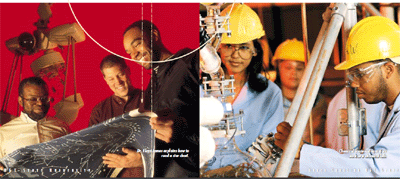  |
|
We're
Not Following Any Path, We're Blazing A
Trail" |
|
UNC at
Greensboro is not on State list of Universities focused
on Nanotechnology |
|
NC
A&T holds patents in Advanced Materials,
Nanotechnology Biotechnology,
Computational Science, Environmental
Sciences, Transportation Systems,
and Public Health. |
|
North Carolina A&T Nano Centers |
-
Center for Advanced
Materials and Smart
Structures
-
Center for Nanoscale
Chemical-Electrical-Mechanical
Manufacturing Systems
-
Engineering Research Center
for Revolutionalizing
Metallic Biomaterials
-
Center for Nanoscience and
Nanomaterials
|
|
UNC at Greensboro Nanoscience
Centers |
-
Center of Research
Excellence in
Nanobiosciences
Source: North Carolina Board
of Science and Technology |
|
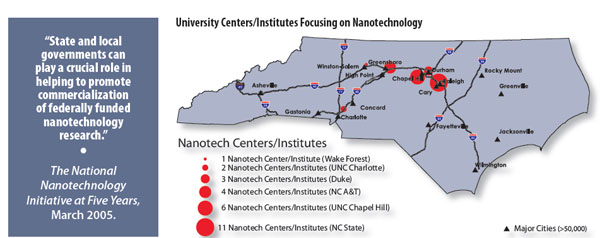 |
|
University
Centers/Institutes Focusing on
Nanotechnology, A Roadmap for
Nanotechnology in North Carolina’s 21st
Century Economy, APRIL 2006, NC Board of
Science & Technology.
UNC at
Greensboro is not on the State list of Universities focused
on Nanotechnology. |
|
|
NCA&T/UNCG Joint School of Nanoscience and
Nanoengineering Building would include the academic
departments, laboratory facilities (teaching an
research), and centers and institutes of the new School
as well as selected centers and institutes currently
located at the partner universities. [ ] UNC
at Greensboro that was not listed as a University
focused on Nanotechnology in April 2006 Roadmap of
Nanotechnology in NC when UNC Board of Governors without
a request by either UNC at Greensboro or NC A&T Board of
Trustees approved the Joint Program in Nanoscience and
Nanoengineering (NCA&T and UNCG pending BOG approval.
Nor did NCA&T nor UNCG request the Nanoscience and
Nanoengineering Building at South Campus of Greensboro
Center for Innovative Development alleged ( NCA&T and
UNCG Millennial Campus). |
|
When
"almost
all of the occupations which will be affected by
nanotechnology will require a BS in engineering with a
broad, interdisciplinary and multi-disciplinary
approach, and an understanding not only of electrical,
mechanical
and civil
engineering, but biology, physics and chemistry as well
" why is Liberal Arts UNC at Greensboro in Nanotechology. |
|
Liberal Arts University of North
Carolina at Greensboro offers Doctoral
degrees in English, Psychology,
Education, Nutrition, Human Development
and Family Studies, Exercise and Sport
Science, and Music none of which
constitute an under standing of
electrical, mechanical, and civil
engineering. |
In 2006 in the category of
Doctorial Granting Universities
NC A&T was rated as a High
Research University in the
Carnegie Foundation
classification of colleges and
universities.
NC A&T
the largest producers of BS.
and PhD minority engineers in
the country, offers approved
master's degrees in Civil
|
 |
|
University Centers/Institutes
Focusing on Nanotechnology, A
Roadmap for Nanotechnology in
North Carolina’s 21st Century
Economy, APRIL 2006, NC Board of
Science & Technology |
|
|
Engineering, Chemistry, Biology,
Industrial Systems & Systems
Engineering, Electrical Engineering,
Mechanical Engineering, Computer
Science, Chemical Engineering, Physics,
Computational Science and Engineering,
as well as doctoral degrees in Energy
and Environmental Systems Engineering,
computational Science and Engineering,
Electrical Engineering, Mechanical
Engineering, and Industrial and Systems
Engineering. "NC
A&T has a 12-year history in Nano
research and has been funded at a rate
of $3 to $5 million per year".* |
|
 |
|
PCG/UNC-NCCCS/UNC Interim report
3.doc/RB.SP.PC.CR.ATPCC.1/CC.14/10May05 Page 34 |
 |
|
UNCG
2006-07 Academic Profile Source : www. UNCG.
edu |
 |
|
Southern Association of Colleges and Schools
(NC A&T) |
|
|
Whereas
Nano Scale Technologies are Experimental
and NCA&T Conducted 250 times Nano
research than the University of
North Carolina at Greensboro why is UNCG
in the Nanotechnology Picture |
|
|
|
In 2011 HMI North
Carolina A&T for the 7th consecutive year
garnered the third largest highest amount of
sponsored research in 16 constituent UNC system
surpassed only by UNC flag ships UNC-Chapel Hill
and NC A&T holds patents in Advanced Materials,
Nanotechnology, |
Biotechnology, Computational Science,
Environmental Sciences, Transportation Systems,
and Public Health, for seventh consecutive
year achieved the third highest research
funding in the 16-constituent University of
North Carolina System with over $60 million
dollars.
|
North Carolina A&T Nano Centers |
-
Center for Advanced Materials and
Smart Structures
-
Center for Nanoscale
Chemical-Electrical-Mechanical
Manufacturing Systems
-
Engineering Research Center for
Revolutionalizing Metallic
Biomaterials
-
Center for Nanoscience and
Nanomaterials
|
|
UNC at Greensboro Nanoscience Centers |
-
Center of Research Excellence in
Nanobiosciences
Source: North Carolina Board of
Science and Technology |
|
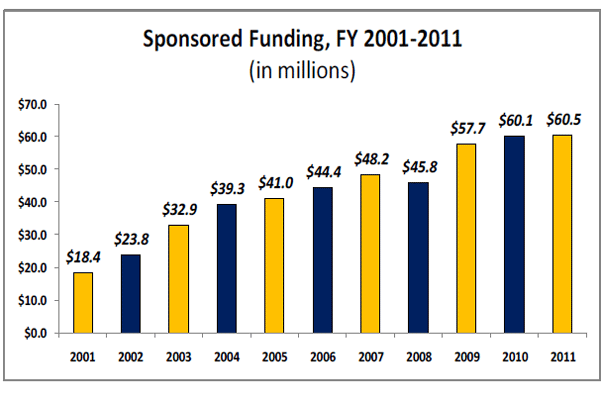 |
|
NC
A&T Sponsored Research 2001 - 2011
|
|
|
NCA&T State University has been
funded at an average rate of
$3-5 million per year in the
area of nanoscience and
nanotechnology. Most of the
research in nanoengineering is
done in the Center for Advanced
Materials and Smart Structures (CAMSS).
Several Centers and projects are
under CAMSS, including the NSF
Center for Research Excellence
in Science and Technology
(CREST), the DoD Center for
Nanoscience, Nanomaterials and
Multifunctional Materials (CNN)
for Homeland Security, the NSF
Nanoscale Science and
Engineering Center (NSEC), the
NSF project on US/Europe
Materials Collaboration:
Self-Organized Nanostructured
Thin Films for Catalysis, the
NSF project on Nanoscale
Interdisciplinary Research Teams
(NIRT), the NSF Major Research
Instrumentation for
Nanoengineering Research, and
the NSF Nanotechnology
Undergraduate Education (NUE)
program. CAMSS also facilitates
many of the materials research
activities of the NASA-National
Institute for Aerospace (NIA).
In addition, the Center for
Composite Materials Research (CCMR)
does research in nano-enhanced
composite materials and the Army
Center of Excellence for
Battlefield Capability
Enhancements (Flexible Displays)
does research in material
characterization and development
of novel displays. [ ] |
|
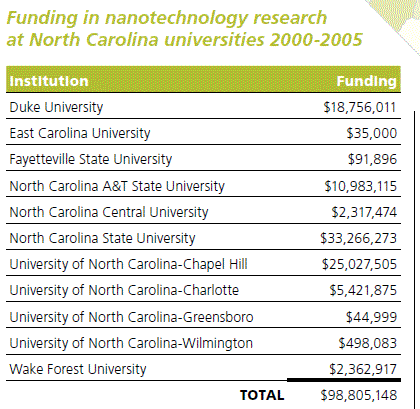 |
|
|
UNC at Charlotte Proposed UNC Tomorrow
Statewide Nano Network collaboration
between UNC institutions involved in
nanotechnology and Nanoscience excludes
NC A&T and NC Central. Between 2000-05
NC A&T conducted 11 Millions dollars of
nanotechnology research compared to 5.5
million at UNCG and $44,000 dollars at
UNCG. HBI NCCU conducted 2.3 Million
compared to $44,000 at UNCG. |
 |
|
UNC Tomorrow
Continuation of UNC Yesterday |
|
|
|
 Repackaging
Jim Crow for the 21st Century as collaboration and
economic develop- ment , fifty plus years after
February 1, 1960 when four HMI North Carolina
Agricultural &
Repackaging
Jim Crow for the 21st Century as collaboration and
economic develop- ment , fifty plus years after
February 1, 1960 when four HMI North Carolina
Agricultural & "
I am so
energized by the potential of this research park
, in particular the joint schools of nano technology
and nano science. The world
is seeing explosive growth today in the
commercialization of nanotechnology. We will have all
of the assets right here in Guilford County that
we need to participate in that explosion, and they will
be right here at the Gateway University Research
Park." said Erskine president of the University of
North Carolina system . [ 1 ]
"
I am so
energized by the potential of this research park
, in particular the joint schools of nano technology
and nano science. The world
is seeing explosive growth today in the
commercialization of nanotechnology. We will have all
of the assets right here in Guilford County that
we need to participate in that explosion, and they will
be right here at the Gateway University Research
Park." said Erskine president of the University of
North Carolina system . [ 1 ]
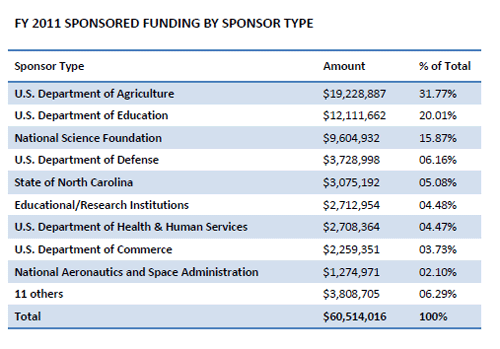




















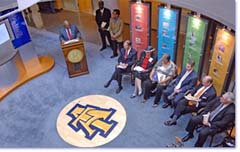
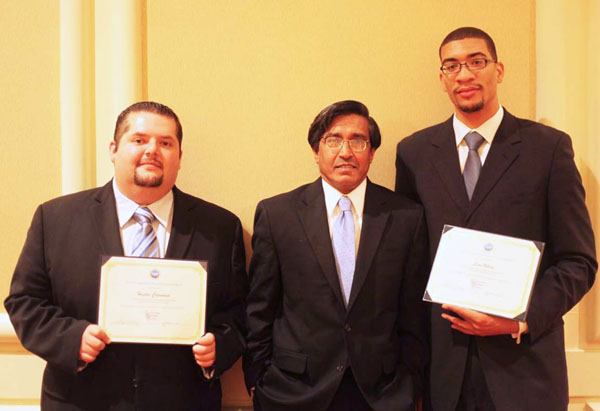 A&T
MECHANICAL ENGINEERING STUDENT
WINS FIRST TEST-BED COMPETITION
FOR INNOVATION AND TRANSLATION
AT NSF ERC ANNUAL CONFERENCE
A&T
MECHANICAL ENGINEERING STUDENT
WINS FIRST TEST-BED COMPETITION
FOR INNOVATION AND TRANSLATION
AT NSF ERC ANNUAL CONFERENCE 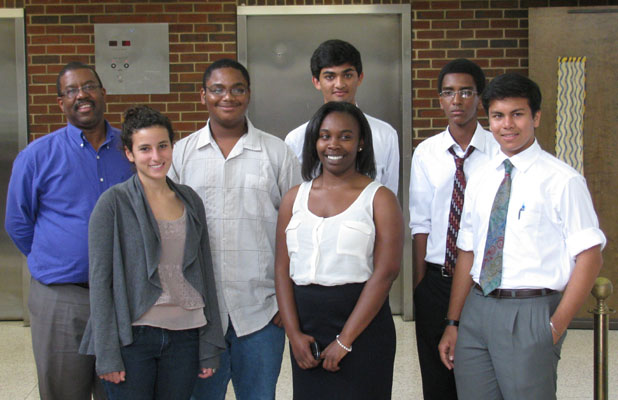
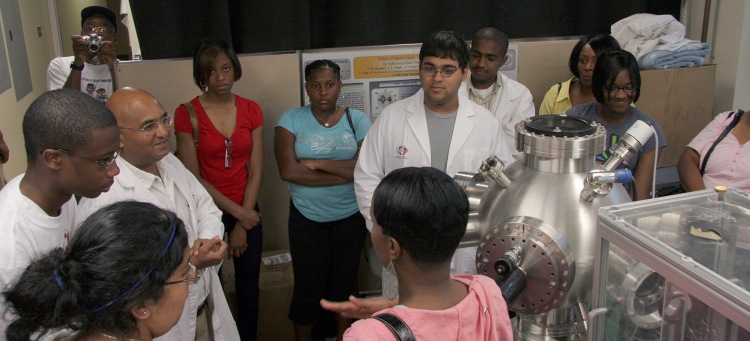 High
school students see the
pulsed laser deposition
High
school students see the
pulsed laser deposition



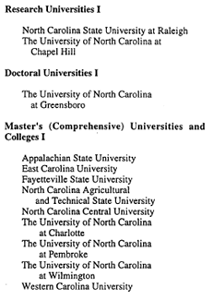
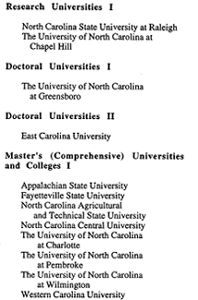

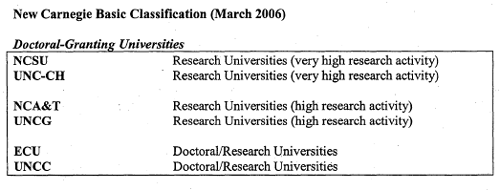
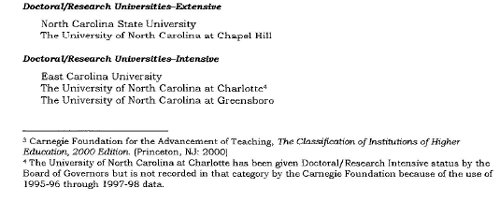
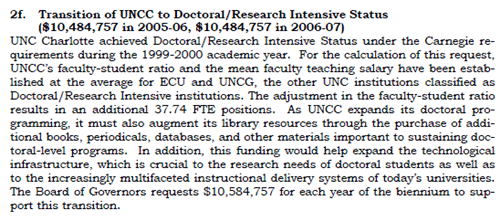


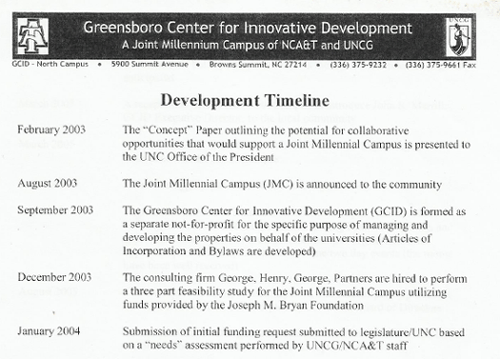

 Credited
in the media as the work of UNCG
district senator Kay Hagan (Greensboro),
June 30, 2003 General Assembly, Session
Law 2003-2984, reallocated former
Central School of the Deaf to UNC BOG to
be used for the establishment of
Millennium campuses of the University of
North Carolina at Greensboro and North
Carolina Agricultural and Technical
State University. According to
media reports UNCG is landlocked.
Credited
in the media as the work of UNCG
district senator Kay Hagan (Greensboro),
June 30, 2003 General Assembly, Session
Law 2003-2984, reallocated former
Central School of the Deaf to UNC BOG to
be used for the establishment of
Millennium campuses of the University of
North Carolina at Greensboro and North
Carolina Agricultural and Technical
State University. According to
media reports UNCG is landlocked.





























